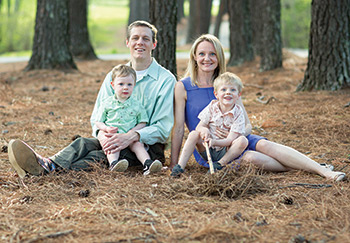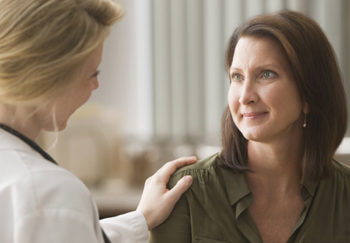
“Will I get cancer?” This is not a question most of us want to think about. But it’s an important discussion to have with your healthcare provider. We now know that gene mutations, which women inherit, cause:
- Almost 10% of breast cancers
- Up to 25% of ovarian cancers
- Between 5 to 10% of endometrial cancers
Cancer and Genetics: Beyond BRCA
Most of us have heard of the BRCA gene mutation. It’s what Angelina Jolie inherited from her mother, who died from breast cancer.
While BRCA is the best-known gene associated with hereditary breast cancer, there are many others. BRCA1 and BRCA2 mutations are linked to 40% of hereditary breast cancers. So the majority of hereditary breast cancers are caused by mutations in other genes.
We can now screen for most of these mutations with a blood test. “It’s getting easier and cheaper to order genetic testing. Ordering only BRCA1 and BRCA2 just isn’t appropriate anymore. Now we can look at many genes associated with cancer risk, so we can make sure we’re not missing a mutation that is very relevant to explaining personal history or family history,” says UVA genetic counselor Martha Thomas.
Will I Get Cancer? Do I Need a Genetic Cancer Screening?
Anyone who can answer ‘yes’ to one of the following questions should get a genetic counselor referral. Thomas calls this a simple “3-2-1” formula.
- Do you have 3 members of your family diagnosed with breast cancer, regardless of age upon diagnosis? Or do you have a family history of a combination of related cancers, including breast, ovarian and pancreatic?
- Do you have 2 female relatives who have been diagnosed with breast cancer, with one diagnosed before age 50?
- Do you have 1 relative diagnosed with breast cancer under age 45? Do you have one first-degree (parent, sibling or child) with ovarian cancer? Or do you have 1 male relative diagnosed with breast cancer, regardless of age?
Genetic testing is always improving. If it’s been longer than six years since you got screened, you should consider re-testing, Thomas advises.
“I always emphasize these are guidelines, not set-in-stone lines,” she says. “By sitting down with a patient, genetic counselors can help them interpret the guidelines, taking into consideration each woman’s personal and family history.”
All Clear But Still at Risk
If your genetic testing results come back negative (meaning no known mutations putting you at high cancer risk), you can still be at risk, as not all mutations have been identified.
“Just because a patient’s genetic test comes back negative doesn’t mean their risk of breast cancer is average,” she says. “I can provide example after example when that hasn’t been the case.”
Nicole Kelleher is one of these cases. Her mother, grandmother and grandfather all died of cancer at young ages. In her early 30s, she turned to Susan Modesitt, MD, founder of the UVA High-Risk Breast and Ovarian Cancer Program.
Blood testing turned up no genetic defects. But Modesitt knew Kelleher was still at risk, so she created a special screening plan. Kelleher had breast MRI scans every six months. That screening found early-stage breast cancer when Kelleher was just 36, long before screenings are recommended for most women.
Considering Genetic Testing?
Asking yourself, “will I get cancer?” Find out what happens during a genetic counseling session at UVA.
Obesity & Cancer
Most of us won’t inherit a high risk for cancer. But another real threat to our health is obesity. “A significant number of colon, endometrial and post-menopausal breast cancers are obesity-related,” notes Modesitt.
So while you can’t control the genes you inherit, you can go a long way in protecting yourself from cancer by maintaining a healthy weight.
If you have a strong family history of cancer, you’ll want to take advantage of the High-Risk Breast and Ovarian Cancer Program. This is a valuable resource as genetic testing results are only one piece of a woman’s cancer risk, says Thomas. These providers can come up with a plan to find cancer at the earliest stage when it is still curable, and even provide strategies to prevent cancer.

